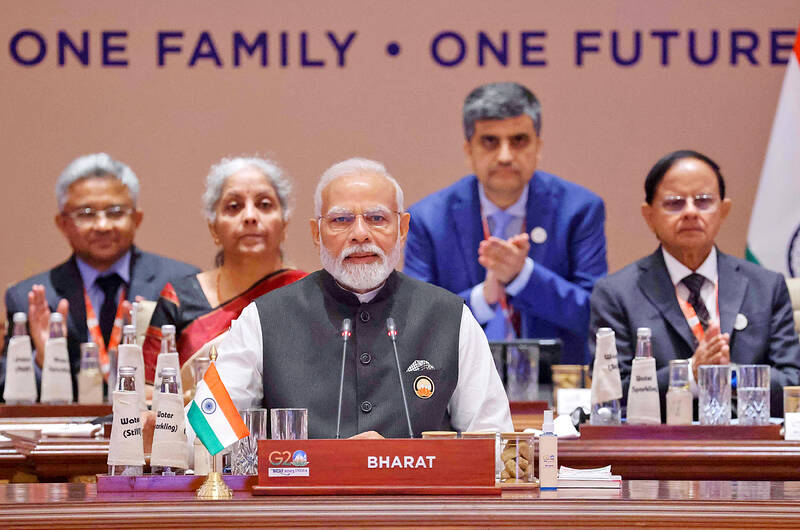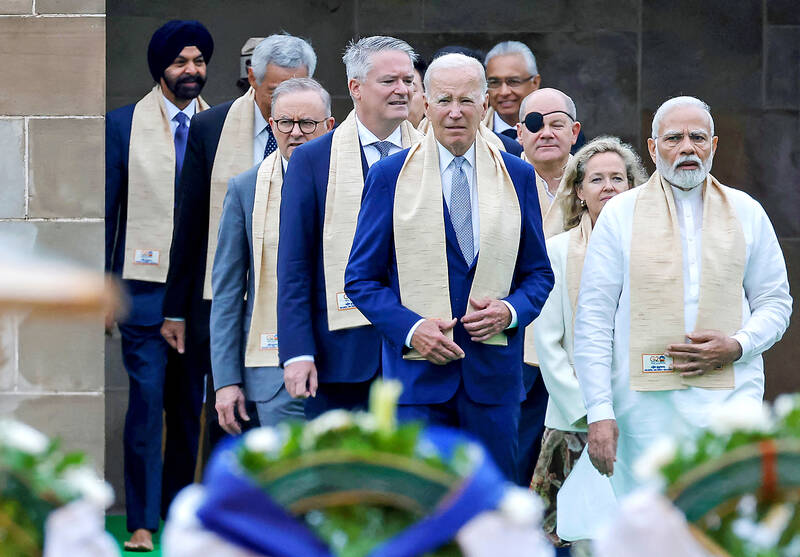Tomorrow marks 365 days since India assumed the G20 presidency. It is a moment to reflect, recommit and rejuvenate the spirit of Vasudhaiva Kutumbakam, or “One Earth, One Family, One Future.”
As we undertook this responsibility last year, the global landscape grappled with multifaceted challenges: recovery from the COVID-19 pandemic, looming climate threats, financial instability and debt distress in developing nations all amid declining multilateralism.
In the middle of conflicts and competition, development cooperation suffered, impeding progress.

Photo: AFP
Assuming the G20 chair, India sought to offer the world an alternative to the “status quo,” a shift from a GDP-centric to human-centric progress.
India aimed to remind the world of what unites us, rather than what divides us.
Finally, the global conversation had to evolve — the interests of the few had to give way to the aspirations of the many. This required a fundamental reform of multilateralism as we knew it.

Photo: AFP
Inclusive, ambitious, action-oriented and decisive — these four words defined our approach as G20 president, and the New Delhi Leaders’ Declaration, unanimously adopted by all G20 members, is testimony to our commitment to deliver on these principles.
Inclusivity has been at the heart of our presidency. The inclusion of the African Union as a permanent member of the G20 integrated 55 African nations into the forum, expanding it to encompass 80 percent of the global population. This proactive stance has fostered a more comprehensive dialogue on global challenges and opportunities.
The first-of-its-kind Voice of the Global South Summit, convened by India in two editions, heralded a new dawn of multilateralism. India mainstreamed the Global South’s concerns in international discourse and has ushered in an era where developing countries take their rightful place in shaping the global narrative.

Photo: AFP
Inclusivity also infused India’s domestic approach to the G20, making it a people’s presidency that befits that world’s largest democracy.
Through jan bhagidari (“people’s participation”) events, the G20 reached 1.4 billion citizens, involving all states and union territories as partners.
On substantive elements, India ensured that international attention was directed to broader developmental aims, aligning with the G20’s mandate.
At the critical midpoint of the 2030 Agenda, India delivered the G20 2023 Action Plan to Accelerate Progress on the Sustainable Development Goals, taking a cross-cutting, action-oriented approach to interconnected issues, including health, education, gender equality and environmental sustainability.
A key area driving this progress is robust digital public infrastructure. Here, India was decisive in its recommendations, having witnessed the revolutionary impact of digital innovations such as Aadhaar, UPI and Digilocker first-hand.
Through the G20, we successfully completed the Digital Public Infrastructure Repository, a significant stride in global technological collaboration. The repository, featuring more than 50 digital public infrastructure programs from 16 countries, will help the Global South build, adopt and scale the programs to unlock the power of inclusive growth.
For “One Earth,” we introduced ambitious and inclusive aims to create urgent, lasting and equitable change. The G20 Declaration’s Green Development Pact addresses the challenges of choosing between combating hunger and protecting the planet by outlining a comprehensive road map where employment and ecosystems are complimentary, consumption is climate conscious and production is planet-friendly.
In tandem, the G20 Declaration calls for an ambitious tripling of global renewable energy capacity by 2030. Coupled with the establishment of the Global Biofuels Alliance and a concerted push for green hydrogen, the G20’s ambition to build a cleaner, greener world is undeniable.
This has always been India’s ethos and through Lifestyles for Sustainable Development, or LiFE, the world can benefit from our age-old sustainable traditions.
Furthermore, the G20 Declaration underscores our commitment to climate justice and equity, urging substantial financial and technological support from the Global North. For the first time, there was a recognition of the quantum jump needed in the magnitude of development financing, moving from billions to trillions of dollars. The G20 acknowledged that developing countries require US$5.9 trillion to fulfil their Nationally Determined Contributions by 2030.
Given the monumental resources required, the G20 emphasized the importance of better, larger and more effective multilateral development banks.
Concurrently, India is taking a leading role in UN reforms, especially in the restructuring of principal organs such as the UN Security Council that will ensure a more equitable global order.
Gender equality took center stage in the G20 Declaration, culminating in the formation of a dedicated working group on the empowerment of women next year. India’s Women’s Reservation Bill 2023, reserving one-third of India’s parliament and state legislative assembly seats for women, epitomizes our commitment to women-led development.
The New Delhi Declaration embodies a renewed spirit of collaboration across these key priorities, focusing on policy coherence, reliable trade and ambitious climate action.
It is a matter of pride that during our presidency, the G20 achieved 87 outcomes and 118 adopted documents, a marked rise from the past.
During our G20 presidency, India led deliberations on geopolitical issues, and their effect on economic growth and development. Terrorism and the senseless killing of civilians is unacceptable, and we must address it with a policy of zero tolerance. We must embody humanitarianism over hostility and reiterate that this is not an era of war.
I am delighted that during our presidency, India achieved the extraordinary: It revitalized multilateralism, amplified the voice of the Global South, championed development and fought for the empowerment of women everywhere.
As we hand over the G20 presidency to Brazil, we do so with the conviction that our collective steps for people, planet, peace and prosperity will resonate for years to come.
Narendra Modi is the prime minister of India

Trying to force a partnership between Taiwan Semiconductor Manufacturing Co (TSMC) and Intel Corp would be a wildly complex ordeal. Already, the reported request from the Trump administration for TSMC to take a controlling stake in Intel’s US factories is facing valid questions about feasibility from all sides. Washington would likely not support a foreign company operating Intel’s domestic factories, Reuters reported — just look at how that is going over in the steel sector. Meanwhile, many in Taiwan are concerned about the company being forced to transfer its bleeding-edge tech capabilities and give up its strategic advantage. This is especially

US President Donald Trump’s second administration has gotten off to a fast start with a blizzard of initiatives focused on domestic commitments made during his campaign. His tariff-based approach to re-ordering global trade in a manner more favorable to the United States appears to be in its infancy, but the significant scale and scope are undeniable. That said, while China looms largest on the list of national security challenges, to date we have heard little from the administration, bar the 10 percent tariffs directed at China, on specific priorities vis-a-vis China. The Congressional hearings for President Trump’s cabinet have, so far,
The US Department of State has removed the phrase “we do not support Taiwan independence” in its updated Taiwan-US relations fact sheet, which instead iterates that “we expect cross-strait differences to be resolved by peaceful means, free from coercion, in a manner acceptable to the people on both sides of the Strait.” This shows a tougher stance rejecting China’s false claims of sovereignty over Taiwan. Since switching formal diplomatic recognition from the Republic of China to the People’s Republic of China in 1979, the US government has continually indicated that it “does not support Taiwan independence.” The phrase was removed in 2022
US President Donald Trump, US Secretary of State Marco Rubio and US Secretary of Defense Pete Hegseth have each given their thoughts on Russia’s war with Ukraine. There are a few proponents of US skepticism in Taiwan taking advantage of developments to write articles claiming that the US would arbitrarily abandon Ukraine. The reality is that when one understands Trump’s negotiating habits, one sees that he brings up all variables of a situation prior to discussion, using broad negotiations to take charge. As for his ultimate goals and the aces up his sleeve, he wants to keep things vague for